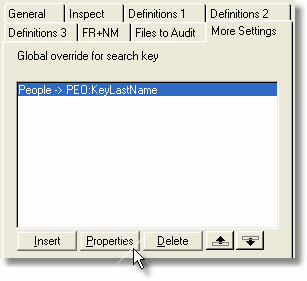"More Settings" Tab - Advanced Settings
This whole Tab is part of advanced settings and won't be visible if the basic interface is set.
The "search key" field (AUD:SearchKey by default) generation inside the audit file it is made automatically by the template, which takes the first key of the file.
If the information of this particular key were of no significant for you, you might want to replace this key by another one. Within this Tab, you choose the file for which you want to override the key selection (press insert), and then select the key for what you want the fields to be taken from. The order and pictures will be taken from the data dictionary.

If you don't want the search key to be generated either with the primary key nor other key indicated here, you can still specify a manual criteria using embed code. Entering the global properties of the app, via the "Embeds" button, look for "FullRecord: After assign search key", and you will see a tree with a branch for each file. Entering here in the branch for the wanted file, simply write
JAL:CLAVE = … (expression)
Where "…" is the expression you want to make, and the search key generation will be replaced by your code.
To add your expression to the existing code, try
JAL:CLAVE = CLIP(JAL:CLAVE) & … (expression)
If you want that the original routine code were not even generated, you must surrounded it with an OMIT group, using the mentioned embed and the previous one "FullRecord: Before assign search key". It is very useful to see the generated source code when doing this.

Disable File Auditing code generation: This option allows you to completely skip all code generation, disabling in fact the template, while maintaining all your extension settings. This might be handy for testing purposes. Although, as no code will be generated, if you have any "manual" call, it will issue a compiler error as it won't be recognized any longer. If you have manual calls and want to retain them while disabling the template, use the next option instead.
Suspend File Auditing: This option will generate all the template code as usual, but none will be executed. The final effect will be as if the template wasn't there, but if you have "manual" calls to the template, they won't issue any compiler error while they won't work any more (they will simply do nothing).
Run-time Disabling: You may choose to disable the auditing in run-time. Use the "Run-time Disabling" field to specify which variable will receive the value. It should be at least a BYTE (boolean) variable as it will have a value of TRUE or FALSE. If this variable is TRUE, then the auditing won't take place. You may activate and deactivate this value at run-time on a need-to basis, if there is some specific procedure where you don't want to audit the files.
Debug: The "debug" option should be always unchecked unless requested by Laro Group support. This option may generate a log file which will make some operations work slower.